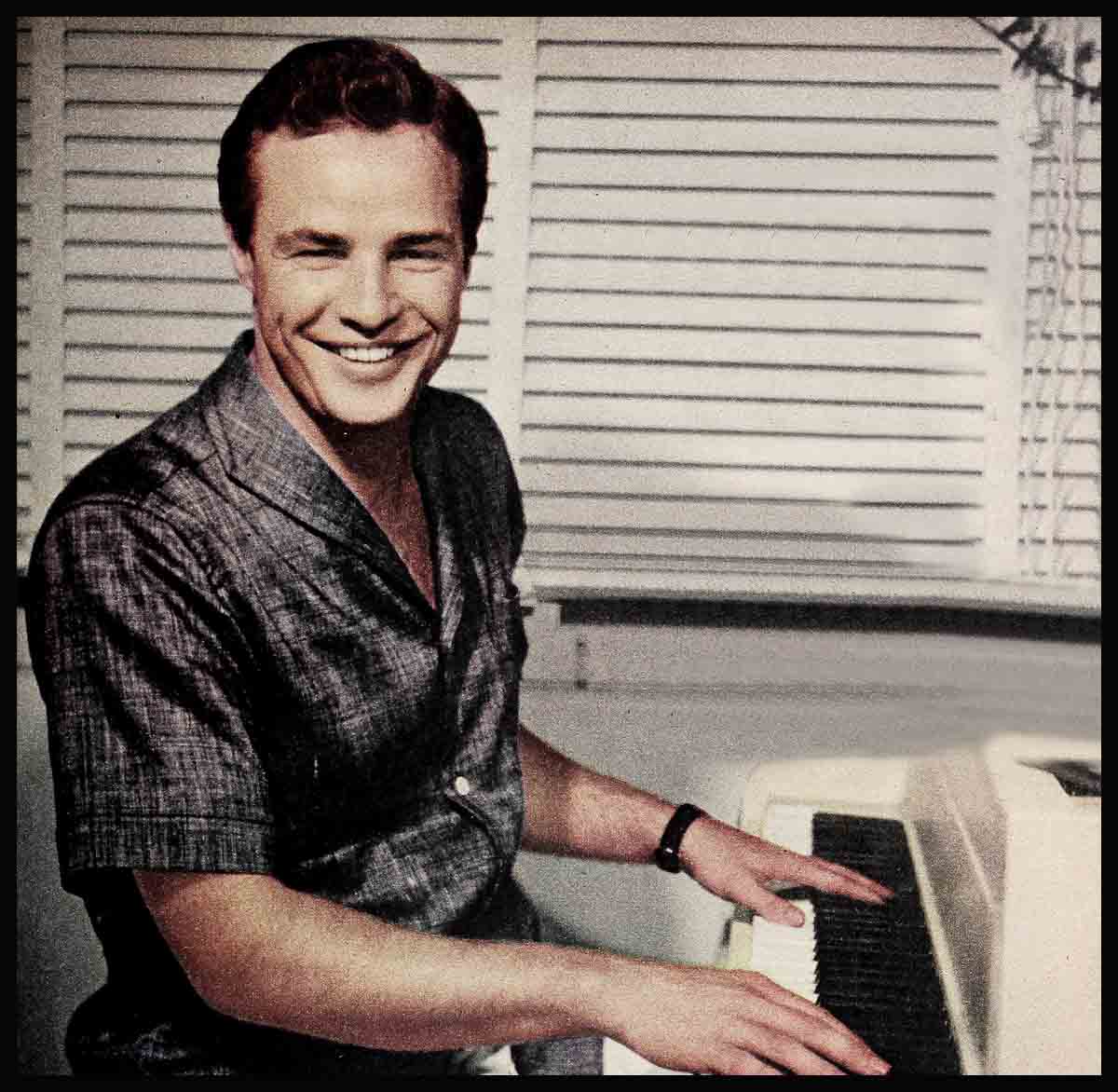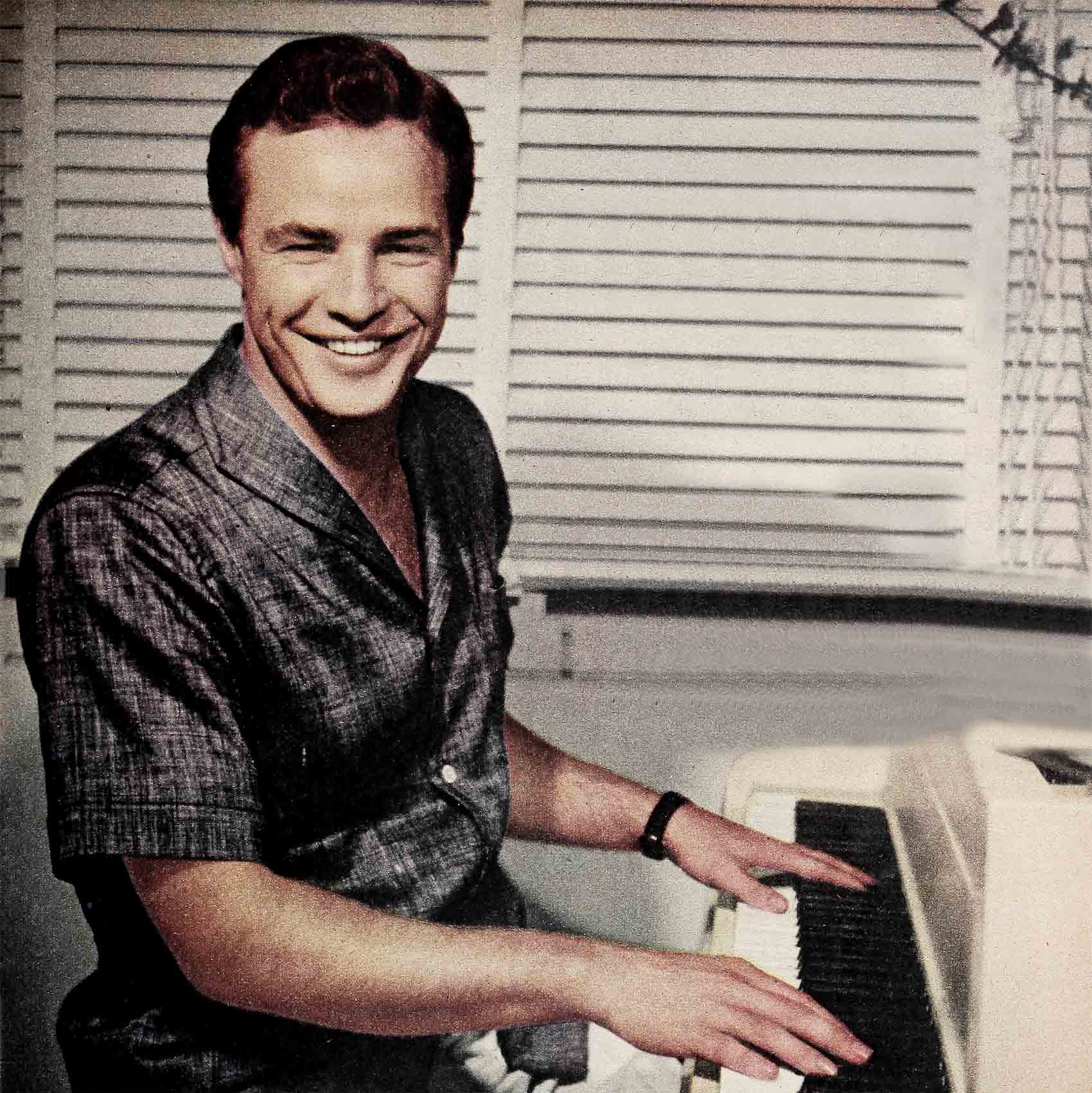
Marlon Brando: Unaccustomed As I Am . . .
It happened at the annual UCLA Theatre Arts Banquet at Scully’s Restaurant in Los Angeles. The Sam Goldwyn Award was to be presented, and one of the drama students invited Marlon to attend. No one really expected him (they didn’t even have a cameraman!) and when he did show up, the delighted boys and girls turned the banquet into a forum and peppered Brando with questions—some of them loaded!
Brando: I’ve never made an after dinner speech in all my life. Most of them are pointless and boring. Let’s dispense with preambles and get to it.
Question: Do you feel that James Dean copied your style in East Of Eden?
Brando: Jim and I worked together at the Actors’ Studio in New York and I have great respect for his talent. However, in that film, Mr. Dean appears to be wearing my last year’s wardrobe and using my last year’s talent.
Question: Have you ever been psychoanalyzed?
Brando: Yes, I was psychoanalyzed. It broadened my scope. I was frightened because actors are neurotic. This is due to their intensity and depth, their low irritability. Just for self education, psychoanalysis is important.
Question: How did psychoanalysis affect you as an actor?
Brando: What draws most of us to the theatre is a neurosis to begin with. When I contemplated analysis, I had the fear that my level of sensitivity or “low irritability” would be lost that I might lose my touch as an actor. But you don’t go into analysis because of concern over your acting ability. It is usually some other concern that draws you there.
Question: What is the basic difference between the stage and the screen?
Brando: What aspect? The money? Personally I would prefer to act on the stage. On the stage there is a feeling of integration within the company which is lacking in films. On the stage you’re dealing with art, pure and simple. Remember, you’re on the stage three hours a night. You have continuity you can’t get in films. On the stage you are encompassed in your own world. On a sound stage there are fifty or sixty people standing around, and a camera right in front of you. There are more elements to distract you in movies. As a result, only concentration can stabilize you. I think I’ve confused the issue enough on that question.
Question: On the stage—what about doing the same part over and over again?
Brando: A good point. I was in Streetcar for three years on Broadway and was transformed into a scratching baboon. It certainly is a drawback to an actor. I attribute this largely to economic factors. To get your money back a play must have a long run, but after a while nothing is new to you in the part. Then you have to rely on technique. It takes the “juice” out of a role. It reminds me of what Jacob P. Adler used to say: “When you come to the theatre, feel 80 per cent of the part and show 50 per cent. If you feel 40 per cent, show only 20 per cent. And if you feel 20 per cent, don’t come at all.

Question: I hear you collect jokes about other actors—can you tell us some?
Brando: I guess every actor collects jokes about other actors. Do I know a clean one—that’s the problem. Many funny things happen on the stage. You mustn’t break down, though, because the stage manager is glaring at you. I recall a night I was playing with Paul Muni in A Flag Is Born—a great, fine and sensitive actor, Muni. Anyway, one night he became so enthused with his part that he blew his false teeth right out of his mouth. He turned around and kept right on with his role. In the same play he died. When an actor like him dies it’s like the birth of an elephant. It took him a half an hour to die! Another night he said to me before we went on, “I don’t want to catch cold lying on the stage. Please cover me with the flag.” When it came to the point in the play, I did so, and a moment later noticed a small tugging at the flag as Muni pulled it slowly down from his face so he could keep an eye on the audience.
Question: I read in a movie magazine . . .
Brando: (quickly) . . . You’re dead!
Question: Have you had disappointments?
Brando: Yes, the making of The Wild One was a disappointment to me. There are so many kids who are confused today. This problem has not been intelligently articulated in entertainment today. The Wild One script ambled and was not focused. At that time Stanley Kramer was having difficulties with Columbia Studios and was not able to oversee the production as he usually did.
Question: Are you going to do a live show on television?
Brando: It wouldn’t interest me at this time.
Question: What is the relationship between an actor and a director?
Brando: In films you are at the mercy of the director. He decides what “take” to print. You have no choice. Again, concentration is most important.
Question: How do you feel about building a personality such as your own?
Brando: I’m not in position to answer that very fairly. I didn’t accomplish what I wanted to in Guys And Dolls. The only time I got a feeling of uniform style in a production was when the Kabuki Theatre came to this country recently. I sat there transfixed.
Question: Were you pleased with Désirée?
Brando: Do we blow up 20th Century-Fox or not? Remember, when you’re acting on the stage, your whole face is the proscenium arch. In movies, you have a big camera stuck in your face.
Question: Would you identify your style as realistic?
Brando: I would say up to this point in my career it has been and at the moment still is realistic.
Question: With whom did you study?
Brando: I studied with Stella Adler and I highly recommend her. I also studied with Lee Strasberg. I feel that; as in any specialized field, it is important to get a good teacher.
Question: What is your view of the American theatre today?
Brando: The trouble with the American theatre is that we have no place for actors to work, just to keep working. If there isn’t any specific part to do, they’re out of luck. Year in and year out you find so many actors with nothing better to do than sit on a stool in Walgreen’s Drug Store or hang around Radio City. There is no place for the actor to be recognized because there is no repertory theatre in America today. It is a dreadful situation.
Question: I understand there is an organization in New York designed to help actors called the Actors’ Studio. What is it?
Brando: Actors’ Studio is a non profit organization headed by Elia Kazan and Lee Strasberg, located in New York City. It is geared for the professional in a workshop setting.
Question: How do you get in?
Brando: Five times a year they hold general open auditions. You work out with a partner. If you pass this preliminary, you are given an audition with Kazan and Strasberg. If you pass that one, you’re in.
Question: Do you want to direct yourself?
Brando: For an actor to direct his own production, it takes a very rare talent. It requires a tremendous objectivity and a sense of theatrical acuteness. A director often times is the only one with a sense of “the whole.” The actor can lose this perspective when directing himself or others.
Question: Have you started your own company?
Brando: Yes, I’ve started my own film company. Yes, I want to direct. But I don’t want to get caught trying. I don’t want to make a half-elbowed attempt at it. . . . I must go now. I’d like to come to your school again. It was most refreshing. I am as indebted to you for being here tonight as you are to me for being here. Good night.
THE END
It is a quote. MODERN SCREEN MAGAZINE OCTOBER 1955




